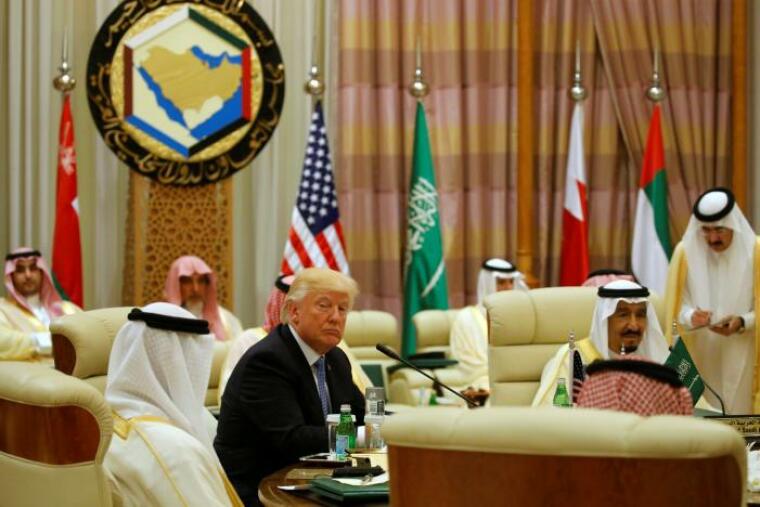Trump urges Muslim leaders to denounce Islamic extremism

U.S. President Donald Trump has urged Muslim leaders to denounce Islamic extremism during a gathering in Riyadh, Saudi Arabia on Sunday.
In his speech at the Arab Islamic American Summit in Riyadh, Trump urged Muslim leaders from 50 Islamic countries to confront "the crisis of Islamic extremism and the Islamist and Islamic terror of all kinds."
The president told the Muslim leaders that he was not there to lecture them about the dangers of radical extremism, but he offered up the U.S. as a committed partner in combating extremism, The Christian Post reported.
"I stand before you as a representative of the American People, to deliver a message of friendship and hope," Trump said. "That is why I chose to make my first foreign visit a trip to the heart of the Muslim world, to the nation that serves as custodian of the two holiest sites in the Islamic Faith," he continued.
Trump maintained that the fight against extremism is not a battle between different religions, sects or civilizations, but a "battle between barbaric criminals who seek to obliterate human life, and decent people all in the name of religion."
According to White House aides, there were as many as five different drafts of Trump's speech prepared by different teams of speechwriters, and that the president worked to reconcile those different ideas into his own address.
Trump reportedly promised that U.S. foreign policy would be guided by what he called "principled realism," and he told Muslim leaders that the U.S. will seek "gradual reforms – not sudden intervention" in areas like human rights.
On the day before the summit, Trump signed a $110 billion arms deal with Saudi Arabia, which would commit the Sunni kingdom to buying various military equipment such as military vehicles, ships, tanks, helicopters, intelligence gathering aircraft, cybersecurity tools and missile defense radar systems.
Some Democrats criticized the deal, with Tulsi Gabbard (D-Hawaii) saying it would enable Saudi Arabia to use the weapons against Yemeni civilians in the civil war.
The U.S. president also signed an agreement with members of the Gulf Cooperation Council to prevent the financing of terrorism called the Terrorist Financing Targeting Center. Members of the council include Bahrain, Kuwait, Oman, Qatar, Saudi Arabia, and the United Arab Emirates.
Deputy National Security Adviser Dina Powell said that the agreement was the "farthest reaching commitment" to date when it comes to cutting off funding for terrorism, with the Gulf countries agreeing to cooperate with the U.S. Treasury Department.
 Christians don't have to affirm transgenderism, but they can’t express that view at work: tribunal
Christians don't have to affirm transgenderism, but they can’t express that view at work: tribunal Archaeology discovery: Medieval Christian prayer beads found on Holy Island
Archaeology discovery: Medieval Christian prayer beads found on Holy Island Presbyterian Church in America votes to leave National Association of Evangelicals
Presbyterian Church in America votes to leave National Association of Evangelicals Over 50 killed in 'vile and satanic' attack at Nigerian church on Pentecost Sunday
Over 50 killed in 'vile and satanic' attack at Nigerian church on Pentecost Sunday Ukrainian Orthodox Church severs ties with Moscow over Patriarch Kirill's support for Putin's war
Ukrainian Orthodox Church severs ties with Moscow over Patriarch Kirill's support for Putin's war Islamic State kills 20 Nigerian Christians as revenge for US airstrike
Islamic State kills 20 Nigerian Christians as revenge for US airstrike Man who served 33 years in prison for murder leads inmates to Christ
Man who served 33 years in prison for murder leads inmates to Christ


 Nigerian student beaten to death, body burned over ‘blasphemous’ WhatsApp message
Nigerian student beaten to death, body burned over ‘blasphemous’ WhatsApp message 'A new low': World reacts after Hong Kong arrests 90-year-old Cardinal Joseph Zen
'A new low': World reacts after Hong Kong arrests 90-year-old Cardinal Joseph Zen Iran sentences Christian man to 10 years in prison for hosting house church worship gathering
Iran sentences Christian man to 10 years in prison for hosting house church worship gathering French Guyana: Pastor shot dead, church set on fire after meeting delegation of Evangelicals
French Guyana: Pastor shot dead, church set on fire after meeting delegation of Evangelicals ‘Talking Jesus’ report finds only 6% of UK adults identify as practicing Christians
‘Talking Jesus’ report finds only 6% of UK adults identify as practicing Christians Mission Eurasia ministry center blown up in Ukraine, hundreds of Bibles destroyed: 'God will provide'
Mission Eurasia ministry center blown up in Ukraine, hundreds of Bibles destroyed: 'God will provide' Church holds service for first time after ISIS desecrated it 8 years ago
Church holds service for first time after ISIS desecrated it 8 years ago Burger King apologizes for 'offensive campaign' using Jesus' words at the Last Supper
Burger King apologizes for 'offensive campaign' using Jesus' words at the Last Supper Uganda: Muslims abduct teacher, burn him inside mosque for praying in Christ’s name
Uganda: Muslims abduct teacher, burn him inside mosque for praying in Christ’s name